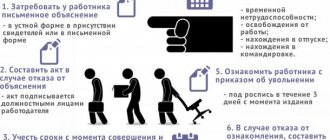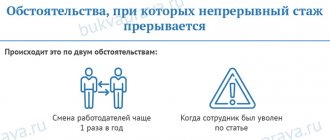Dismissal is the end of the employment relationship between the subjects of contractual relations: the employer and the employee of the enterprise (organization), individual entrepreneur. The grounds and guarantees arising in the process of dismissal from work are determined by labor standards, in particular, the Labor Code of the Russian Federation.
The reasons for dismissal from work are recognized as complying with the law if they meet the following criteria:
- the person is dismissed for legal reasons, with actual circumstances;
- compliance with the employee dismissal mechanism;
- termination of labor relations for a period of time.
If these conditions are met, the reasons for the citizen’s dismissal comply with the rules of law.
When the employment relationship ends
Possible reasons for dismissal from work are established by law. In particular, they are the following reasons:
- An agreement (agreement) between the subjects of legal relations.
- Expiration of the agreement.
- Termination of the agreement on the initiative of the employer.
- Transfer of an employee with his consent to another employer.
- Refusal of an employee to work due to a change in ownership of property, in connection with reorganization procedures in the company.
- An employee’s refusal to work due to changes that are not specified in the contract.
- Refusal of an employee to be transferred to another type of work due to his state of health, confirmed by the conclusion of specialists.
- Refusal of an employee to be transferred to another region.
- Circumstances that occurred due to force majeure.
- Violation of the provisions of the Labor Code if they exclude the possibility of continuing work activity.
What reason for dismissal should be given at the interview?
First of all, don't lie. Every decent company has a security service. And she will make inquiries about you, so that the truth inevitably comes out.
The truthfulness of the answers is relevant not only to the reason for dismissal during the interview, but also to work experience, marital status... This is all easy to check.
Secondly, there is no need to fuss. If the interview takes place “eye to eye,” then any hesitation in answering this question will arouse suspicion. Don't try to avoid a direct answer.
Prepare, think about what to say at the interview about the reasons for changing jobs at the interview. Answer clearly, confidently, without unnecessary details. Avoid filler words.
Thirdly, the answer should not be stereotyped and sound rote. This will also raise doubts about your sincerity.
Example: to the question “Why did you get laid off?” you answer: “Crisis. Many are being laid off now.”
Wrong answer, even if partly true. Typically, when there is a storm, the ship gets rid of ballast. The situation is the same in the era of economic crisis.
Agree, recognizing yourself as “not a valuable cargo” is not very pleasant. Therefore, you need to come up with a reason that is not so offensive to your pride and more convincing in the eyes of the employer.
To the question “Why were you fired immediately after the probationary period?” one can, of course, say that this is a constant method of a company that does not want to increase wages. But it’s better if you say that the dismissal occurred by agreement of the parties, that you understood that this is not yours, that this is not what you would like to do.
How to explain the reason for dismissal at an interview? This is also covered in a short and practical video.
When an employer has the right to separate employees
Note that the reasons for dismissal from work at the initiative of the employer are varied, for example:
- liquidation measures at the enterprise or closure of the work of individual entrepreneurs;
- staff reduction.
But what guarantees are provided to the population in these cases? Let's give examples.
- Part 1 of Article 180 of the Labor Code of the Russian Federation guarantees that an employer, in the event of liquidation, reduction of staff or numbers, is obliged to offer an employee a vacant position.
- When staffing is reduced, the employee must be paid severance pay in the amount of average earnings, wages and the monetary value of unused vacation. At the same time, wages are due according to the average for the entire period of employment. This is the time when a person is looking for a job and is registered with the labor exchange, but, in general, no more than two months.
main mistakes
Criticism of the previous leadership, demonstration of grievances and complaints. “The boss is always right” - in these circumstances this formula works.
It doesn't matter who was actually right in the dispute with the authorities. Victory is obviously on the side of the one who is stronger. Deal with it. You need to find a job and the reputation of a brawler and critic in this matter is a bad help.
We can say that a new director came and brought his team. There was no place for you in it. But you are grateful to the previous management for the experience gained and are now ready to put it to good use elsewhere. One can also talk about different visions of the company’s development prospects. Important: the employer often wants to see a reference from your previous place of work. Therefore, when leaving, do not slam the door.
Small salary. Even if this is the absolute truth, do not make it the main argument in finding a new job.
And if you nevertheless decide to write “financial considerations” in the “reason for dismissal” , be prepared to justify your claims for a good salary. Give compelling reasons, prove your competence as a professional. In other words, justify your market value.
Negative atmosphere in the team. Forget the stories about “energy vampires” sitting in the same office with you. And about how Ivan Ivanovich constantly sniffles, and you’re sick of it. In order not to kill Ivan Ivanovich, you decided to change your job.
It will not work! Never speak ill of former companies or colleagues. This will attach to you the label of “scandalist” or “conflict person.” And ultimately, it will prevent you from finding a job.
Advice: if you still have ill-wishers at your previous place of work, then it makes sense to warn the new management about this and add that they didn’t want to let you go, and therefore refused to give a positive recommendation.
Competent and correct answers to various questions, not only about the reason for leaving your previous job, will help you leave a good impression. The following publications will help you prepare answers to them in advance:
- What do you get asked most often?
- How to answer why you want to work for this company and why they should choose you?
- What logical and analytical problems might you be asked to solve, what tests might you be asked to take?
- What to do if, for example, you are asked to sell something?
- How to correctly answer questions about salary?
Employer initiative
Here are the most common reasons for dismissing an employee at the initiative of the employer:
- the employee’s inadequacy for the position held;
- failure to fulfill the employee’s job duties without valid reasons;
- severe violation of labor duties by an employee (failure to appear at work for more than 3 hours, theft, coming in drunk, non-compliance with labor protection provisions, intentional actions by an employee, an immoral act committed by a teacher, etc.);
- providing the employer with false documents when applying for a job;
- other cases.
Notice period for dismissal
As a general rule, an employee must notify them of their desire to leave the workplace two weeks before leaving. The counting day of the period will be the day following the date of submission of the application. By mutual agreement, the period can be reduced and even canceled completely.
An employee may go on vacation during the working period, either paid or unpaid, if he is entitled to it, as well as sick leave. The dismissal dates will not change. That is, despite the fact that the person is actually absent from the workplace, he continues to be registered in the company. If he had gone on vacation without being fired, this would not have affected his contract, so such employees are not required to work later.
In a number of cases, a person is physically unable to continue working, then there can be no talk of any work off, but the employee must document the need for quick departure.
Two more exceptions to the two-week rule:
- employees on a probationary period – three days;
- officials and managers – one month.
Essentially, the employer needs a two-week period to find a replacement for the employee. But if the production does not require the presence of a specific specialist, then leaving without work is acceptable.
Employee initiative
The most peaceful way to end an employment relationship is the employee’s initiative to leave work. The reasons for voluntary dismissal may be related to the citizen’s professional activities or personal reasons. The employer specifies Article 77, 1, clause 3 as the basis for dismissal - at his own request. But the reasons for leaving a job voluntarily may also be related to other circumstances in the employee’s life.
Usually, the employer has the right not to let the employee go without working for 2 weeks. Are there any reasons for dismissal without working through the Labor Code of the Russian Federation? Yes, an employee can be fired without working if there are good reasons for this. In other situations, he is required to work at the enterprise for 2 weeks so that the employer can find a replacement for him. Thus, the reasons for voluntary dismissal without work in all cases can only be valid.










